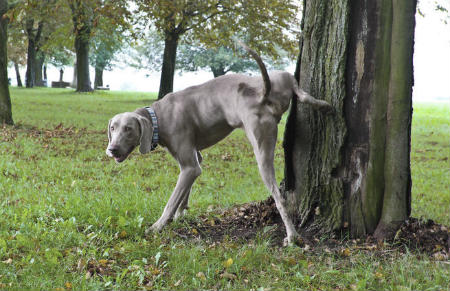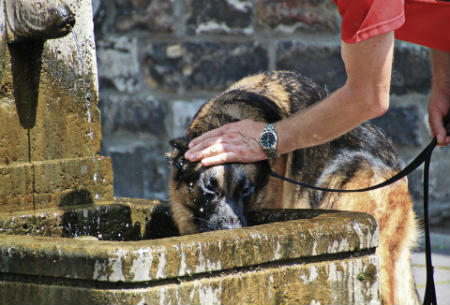Currently there are numerous conditions that can limit the good physical condition and well-being of our canine friends, even more so when they are older. One of them is kidney failure.
Kidney failure in older dogs is one of the most common diseases that can affect the health of these animals. In fact, it is one of those with the highest canine mortality rate in recent years.
That is why in this article we will talk a little about kidney failure in older dogs: its causes, consequences and treatment are some of the important aspects that anyone with a pet dog should know to combat this condition.
Kidney failure in dogs: what is it?
Kidney failure in dogs is a condition that occurs when the animal's kidneys are not able to function properly in eliminating waste, which causes the concentration of urine.
The animal body generally naturally produces numerous toxins throughout the day. These toxins travel through the bloodstream to the kidneys, where they are filtered by water, and are later eliminated from the body through urine. As this process is not carried out correctly, but rather the toxins remain stagnant in the bloodstream, this is when kidney failure occurs in dogs .
Kidney failure in dogs can occur acutely or chronically.
Acute
It is a sudden process associated with different aspects, such as excessive blood bleeding, or conditions of the circulatory system in animals due to the ingestion of inappropriate medications or toxic substances. Generally anorexia, dehydration or urinary problems can be the cause of this kidney failure in dogs, and in most cases it is reversible.

Chronicle
It is an irreversible condition . Generally speaking, we talk about chronic kidney failure in older dogs because it is a slower process that grows as the dog ages. It is caused by prolonged acute kidney failure when it is not treated. Canine diseases, such as hypertension or diabetes, can negatively contribute to the appearance of this disease. Chronic kidney failure is referred to in older dogs when there is only 30% functionality in the kidneys.
How do I know if my dog may have kidney failure?
We can notice the presence of kidney failure when the dog ingests excessive amounts of water during the day and it increases more and more. There will come a time when the level of water ingested by the animal will not be sufficient and conditions will begin due to the presence of harmful substances in the blood and the incorrect functioning of the kidneys in their elimination.

This is known as excessive thirst: you will watch your dog constantly looking for water and urinating repeatedly. Discolored and poorly concentrated urine is another common symptom, as are loss of strength, pain when urinating, vomiting, decreased urine output, and breath that smells like ammonia. These are symptoms that the disease is in constant progress, deteriorating. increasingly the health of the dog.
In addition, kidney failure in dogs usually presents other symptoms, such as loss of coordination. In this case, the dog appears disoriented and discouraged. The absence of appetite, weight loss and decreased muscle mass are other characteristic symptoms of possible kidney failure in dogs .
What consequences does kidney failure have in dogs?
Complications of kidney failure in older dogs are usually diverse. From the deterioration of the canine's health and well-being, to other aspects of the animal, they can be some of the most frequent. Because harmful substances accumulate in the dog's body that should be eliminated through urine, one of the consequences of kidney failure in dogs is usually bad breath and the appearance of mouth ulcers.

Alteration of the dog's blood pressure is another result of kidney failure. That, in turn, can cause visual disturbances. Anemia, dehydration, pain and fluid retention are some of the most visible complications when kidney failure occurs in older dogs.
Treatment of kidney failure in dogs
Once kidney failure in dogs is confirmed, the veterinarian will prescribe medications to maintain the canine's state of health. If it is an acute disease, the recommendations are aimed at improving the dog's diet, necessarily supplying amino acids and vitamins in the feed given to our friend, as well as vitamin supplements that help reduce this alteration in the animal.

In more serious cases, in addition to feeding and supplying vitamins, we seek to establish a balance in the dog's body and kidney function, indicating medications to increase circulation and others that contribute to suppressing the toxins produced by the dog's body. .
Prevention of kidney failure in dogs
Although kidney failure in dogs is difficult to detect and prevent in many cases, some aspects could contribute to reducing the risk of contracting it .
- Taking care of your canine's diet : it is undoubtedly one of the most important aspects to avoid this disease. Taking care that food and water consumption is balanced will ensure that the possibility of kidney failure in dogs is minimized.
- As far as possible, reduce the use of different types of medications and surgical procedures: it also helps prevent kidney failure in dogs from appearing.
- Administer adequate treatment indicated in time by a veterinarian in case of bacterial infections : this is undoubtedly another key element to eliminate the possibility of kidney failure in dogs.

Finally, regular visits to the doctor and constant monitoring of the dog's health are an important part of this preventive process. Routine examinations and checkups are essential to keep the dog in good health and eliminate the possibility of kidney failure affecting its condition and well-being.
Other articles about dog health that may interest you:











